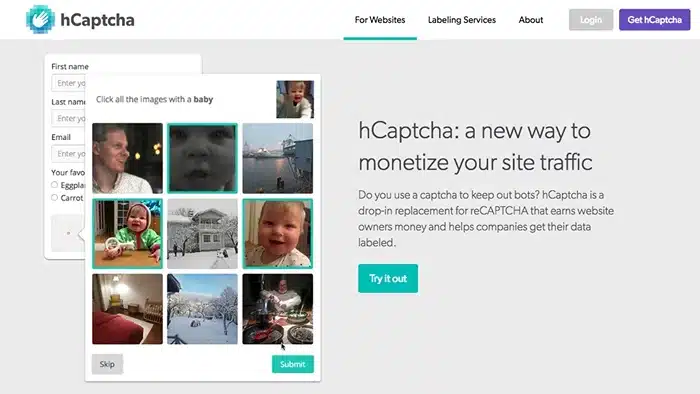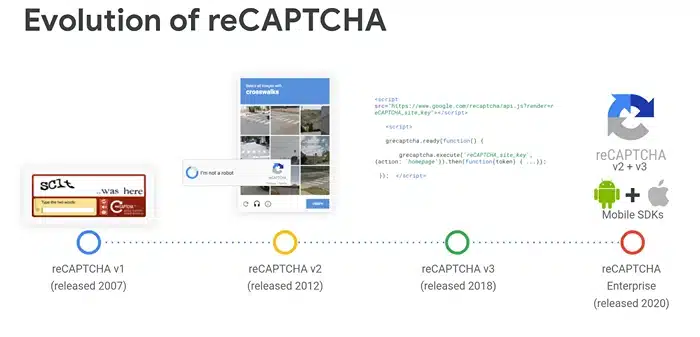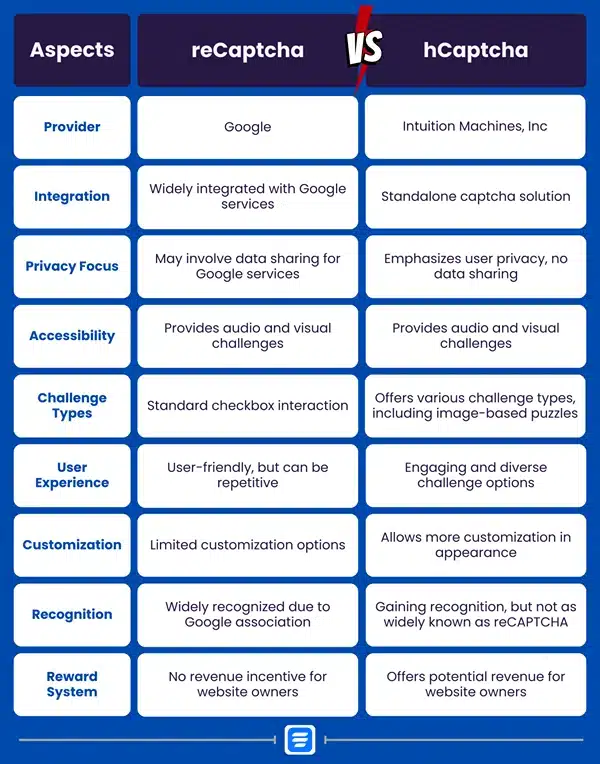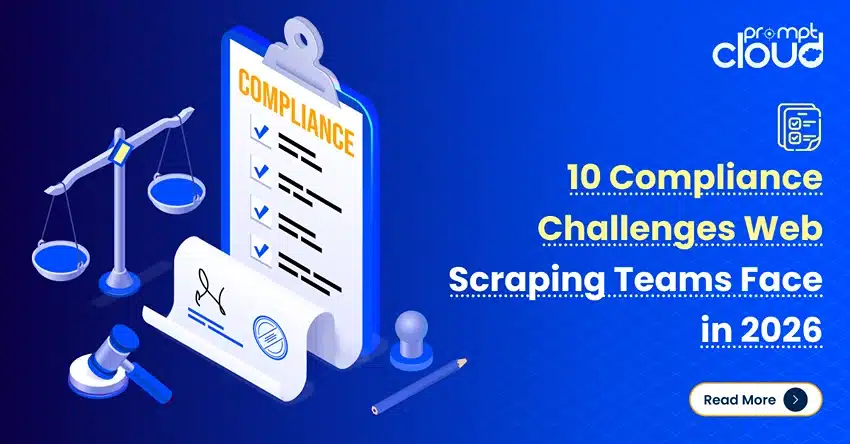
If you’ve ever tried to scrape a website or build an automation script, chances are you’ve run into some form of CAPTCHA—the kind of roadblock that asks you to click on traffic lights or buses like you’re back in kindergarten. Annoying, yes. But also one of the most common tools for keeping bots out of websites.
These days, the two big players in the CAPTCHA world are hCaptcha and reCAPTCHA. If you’re wondering which one is better at blocking bots (and which one is easier to bypass), you’re not alone. The debate around hCaptcha vs reCAPTCHA has been heating up, especially as AI, browser automation, and machine learning keep pushing the limits of what bots can do.
Here’s the reality: CAPTCHAs were never meant to be perfect. They’re just one layer of defense in a much bigger web security puzzle. But as bots get smarter, so do the tools designed to stop them, and the people building solvers to get around them.
In this article, we’ll break down how CAPTCHA vs reCAPTCHA vs hCaptcha compare, how AI is changing the game, and what all of this means for ethical scraping, automation, and web security. Whether you’re trying to protect a platform from bot abuse or working with scraping scripts that need to deal with these defenses responsibly, this guide is for you.
What is hCaptcha?

Image Source: TechRadar
Let’s start with the newcomer: hCaptcha.
hCaptcha is a CAPTCHA system that challenges users with those familiar image tasks—pick all the boats, traffic lights, crosswalks, and so on. But the way it works under the hood is different from what Google does with reCAPTCHA.
For one, hCaptcha isn’t run by a data giant. It was built by Intuition Machines, which designed the system to be privacy-first. That means hCaptcha doesn’t track users all over the web the way Google might. Instead, it relies on the accuracy of how you solve the visual puzzle to determine if you’re a bot or a human.
There’s also a money angle here. Unlike reCAPTCHA, which is free but controlled by Google, hCaptcha pays site owners a small amount for every solved challenge. Why? Because those solved puzzles are actually being used to label training data for AI companies. So it’s kind of a marketplace: websites get protection, AI teams get labeled images, and hCaptcha makes the connection.
Platforms that are big on privacy, like Cloudflare, have already made the switch to hCaptcha. If you’ve seen it in the wild, that’s probably where.
How reCAPTCHA Works (and How It’s Different)
Now let’s talk about the other side of the coin: Google reCAPTCHA.

Image Source: Google Cloud
You’ve definitely seen it before: checkboxes that say “I’m not a robot,” or sometimes nothing at all. That’s reCAPTCHA. Over the years, Google has rolled out different versions—v2, v3, and invisible reCAPTCHA, each one a little sneakier than the last.
The big difference? reCAPTCHA is less about the challenge itself and more about watching what you do. It tracks mouse movement, click speed, IP history, browsing patterns, and other signals to score how “human” your behavior looks. Most of the time, it doesn’t even ask you to solve anything—just being on the site is enough for Google to decide.
This can be good for user experience (less clicking), but it comes with a trade-off: data. When you use reCAPTCHA, you’re giving Google a lot of behavioral information. That’s a sticking point for privacy advocates and companies that don’t want to share data with a tech giant, especially if that data ends up helping train Google’s own AI tools.
So if you’re comparing Google reCAPTCHA vs hCaptcha, it comes down to control. reCAPTCHA is smooth and seamless but data-heavy. hCaptcha is more manual but gives you more control over how your users’ data is handled.
hCaptcha vs reCAPTCHA: A Feature-by-Feature Showdown

Image Source: Fluent Forms
Now that you know what each CAPTCHA system does, let’s dig into how they stack up. When it comes to hCaptcha vs reCAPTCHA, it’s not just about which one is harder to solve—it’s also about what kind of trade-offs you’re willing to accept. Here’s how they compare across the stuff that actually matters:
Security and Bot Resistance
Both hCaptcha and reCAPTCHA are built to stop bots, but they go about it in slightly different ways.
reCAPTCHA leans heavily on behavioral analysis. It watches your cursor, how fast you scroll, and how you click—then it assigns a risk score. In v3, most users never even see a challenge unless their score is suspiciously low.
hCaptcha is more direct. It assumes you might be a bot and makes you prove otherwise by solving a challenge. This actually makes it tougher for automation scripts to pass through undetected.
Who wins? From a pure security standpoint, hCaptcha arguably has the edge right now. Its challenges are harder to solve with automation. But reCAPTCHA’s invisible scoring can filter out low-effort bots without annoying users.
Ease of Solving (User Experience)
Let’s be real—nobody enjoys solving CAPTCHAs. But some are worse than others.
reCAPTCHA (especially v3) is more passive. Most users never notice it unless something triggers a red flag. That makes it easier for humans to use websites smoothly.
hCaptcha, on the other hand, is more hands-on. It throws image puzzles at you more often, even for normal users. For platforms that care a lot about UX, that extra friction can hurt conversion rates.
Who wins? If you’re optimizing for user experience, reCAPTCHA wins. If you’re prioritizing security over convenience, hCaptcha might be a better bet.
Data Privacy and Ownership
This is where things get interesting. Google runs reCAPTCHA, and that means it’s collecting a lot of behavioral data across the web. That data might be used to improve Google’s own services, including its AI models.
hCaptcha doesn’t play in that space. It was designed as a more privacy-respecting alternative. It also gives website owners more control over how data is handled, and it doesn’t tie your traffic to a massive ad network.
Who wins? hCaptcha takes the win here. If privacy and data sovereignty matter to you (or your users), it’s a better pick.
Integration and Customization
Both tools are easy to plug into most modern websites and apps. They support popular platforms and frameworks, and both come with decent developer documentation.
That said, reCAPTCHA has been around longer, so it enjoys more out-of-the-box compatibility. If you’re working in a tech stack that heavily favors Google products, reCAPTCHA might be easier to implement.
Who wins? Slight edge to reCAPTCHA for broader ecosystem support, but hCaptcha is catching up fast.
The Rise of hCaptcha Solvers and AI-Based Bypass Tools
Here’s where things get tricky, because as CAPTCHAs get smarter, so do the people trying to beat them.
Today, there’s a growing market for hCaptcha solvers and bypass tools that use AI, browser automation, and machine learning to mimic human behavior. If you’re scraping the web or building automation workflows, you’ve probably bumped into tools like Puppeteer, Selenium, or Playwright—all of which can be scripted to interact with CAPTCHA systems.
How Solvers Actually Work
A hCaptcha solver is usually a script or service that tries to automatically detect the correct answers to image-based challenges. Some rely on pre-trained machine learning models to identify objects in images, like recognizing a traffic light in a grid. Others use third-party CAPTCHA-solving services, where actual humans solve the challenges for a small fee per request.
Another method is browser emulation. Tools like Puppeteer can mimic a real user’s behavior—mouse movements, delays, clicks—to avoid raising red flags. Combined with proxy rotation and cookie handling, these methods can fool CAPTCHA systems (at least temporarily).
Are They Accurate?
The answer is: it depends.
Basic solvers have a low success rate, especially on platforms that randomize images or introduce time-based checks. More advanced tools that use AI or human-in-the-loop services can have success rates upwards of 80-90%, but they often come with higher costs, and they still fail sometimes.
Plus, services like hCaptcha are constantly evolving. They patch known bypasses quickly, making the arms race even more intense.
Automation, Ethics, and Legal Landmines
If you’re a web scraper or automation engineer, here’s the big question: Is bypassing CAPTCHAs legal or ethical?
The short answer? It’s complicated.
When CAPTCHA Solving is Okay
If you’re scraping public data, following a website’s terms of service, and building tools that respect rate limits, many people consider that fair use, especially for competitive intelligence, research, or business analytics.
Some enterprise scraping providers even use CAPTCHA solvers ethically as part of a larger compliance strategy, like identifying public data without violating platform rules or user privacy.
When It Crosses the Line
On the flip side, using hCaptcha bypass tools to abuse services, fake accounts, or spam websites is clearly unethical—and potentially illegal. Some platforms explicitly prohibit CAPTCHA circumvention in their terms, and doing so can lead to IP bans, legal threats, or worse.
Different countries also interpret scraping laws differently. In the U.S., the HiQ Labs v. LinkedIn case showed that scraping public data isn’t automatically illegal—but that doesn’t give you a free pass to do whatever you want.
Bottom line: Scraping is a powerful tool. But with great power comes the need for clear boundaries.
The Future of CAPTCHA in the Age of AI
Here’s the million-dollar question: Are traditional CAPTCHAs dying?
With AI growing fast, CAPTCHAs are under pressure. As solvers get better at recognizing images and mimicking human behavior, platforms are starting to rethink their strategy.
Some are turning to behavioral biometrics—tracking how you type or swipe instead of showing puzzles. Others are experimenting with invisible CAPTCHAs, device fingerprinting, or even biometric tools that don’t feel like CAPTCHA at all.
But that opens up new privacy concerns and accessibility issues, especially if AI is the only thing separating a “real” user from a blocked request.
So, what’s next?
We’ll likely see more dynamic CAPTCHA systems—ones that adjust based on context, device, or user history. Instead of being the same challenge for everyone, it might become a personalized gatekeeper that bots can’t easily predict.
Whether that makes them harder or just more annoying remains to be seen.
Choosing the Right CAPTCHA (and Doing It Right)
So, when it comes to hCaptcha vs reCAPTCHA, which one should you pick?
It depends on your priorities:
- If you care about user experience and seamless behavior analysis, reCAPTCHA might be a better fit.
- If your platform values data privacy, custom control, and better resistance to automation, hCaptcha is worth a serious look.
For ethical scrapers, automation engineers, and data teams: remember that these systems are getting smarter, but so are the risks. It’s not just about breaking through CAPTCHA anymore. It’s about knowing where the ethical and legal lines are.
At PromptCloud, we deal with these challenges every day. Our enterprise-scale data extraction services are designed to navigate CAPTCHAs the right way—ethically, transparently, and with compliance in mind. If you’re building scraping workflows and want to stay on the safe side, we can help you do it without breaking the rules.Need help solving complex scraping problems without crossing legal or ethical boundaries? Reach out to us and let’s talk about how we handle web security, data access, and CAPTCHA the right way.


















